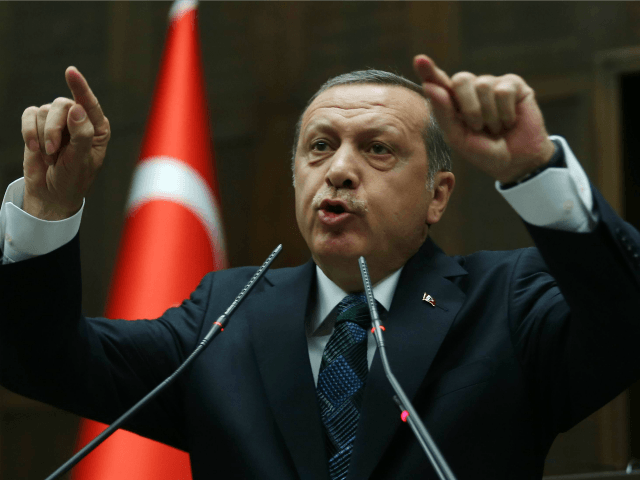The Turkish Foreign Ministry announced Wednesday that it had officially summoned the chargé d’affaires at the Russian embassy to protest an attack that left one Turkish soldier dead, killed by fighters allied to the Syrian People’s Democratic Union (PYD), which is allied with Russia.
Foreign Ministry spokesman Huseyin Muftuoglu confirmed the death of one soldier in Hatay, a Turkish province close to the Syrian border, after PYD fighters exchanged gunfire with the Turkish military, according to the state-run Anadolu Agency.
Muftuoglu told reporters it was necessary to speak to the Russian envoy to discuss the “kind of steps that should be taken in order to prevent similar cases in the future” and to warn that Turkey would actively attack the PYD if a similar incident occurred again.
“It is an attack on Turkey from a region that is said to be under YPG-PYD control,” Muftuoglu explained. “However, the Russian chargé d’affaires was summoned because Russia is responsible for monitoring violations in this region. Through the visit of Russian chargé d’affaires, our views about the involvement of Russian military elements in Afrin were repeated.”
“Coordination between Turkey and Russia, which are the guarantor countries of the ceasefire, will be the most effective method before any arbitration on the ground for truce-related issues,” Müftüoğlu concluded.
Also on Wednesday, Turkish Deputy Prime Minister Numan Kurtulmus lamented that Russia refused to abandon cooperation with the YPG. He noted that his government had made little progress in convincing Washington to do the same. “This is one of the biggest sensitivities we as a government have. Unfortunately, both Russia and the U.S. have not been sensitive to this as part of both the Raqqa and Manbij operations,” he said.
Russia has been the main actor putting together numerous ceasefires throughout Syria in an attempt to reach a political solution to the civil war. As terrorist organizations do not participate in these talks, and some parties, like the YPG, are not fighting Assad directly so much as seeking independence, these talks have largely failed to stop the violence.
Russia has also participated in trilateral talks with Turkey and the United States to ensure cooperation in Syria. In early March, representatives of the three nations met to discuss Turkish military activity in the town of Manbij, currently held by Kurdish troops and, thus, considered a threat to Turkey. “If coordination [with the U.S. and Russia] can’t be established, then there could be a risk of confrontation, which we do not wish for,” Turkish Prime Minister Binali Yıldırım said of the talks later in the week.
The PYD is the political arm of the militias known as the People’s Protection Units (YPG and YPJ) and operates in what is known as Rojava, or Syrian Kurdistan. They have been known to cooperate on occasion with the Kurdistan Workers’ Party (PKK), a U.S.-designated Marxist terrorist organization. The YPG has often cooperated with U.S. troops, however, providing coordinates for airstrikes against the United States. It has similarly worked with Russia, although Russia’s main ally in Syria is dictator Bashar al-Assad.
This week, YPG spokesperson Redur Xelil confirmed that the YPG have “direct relations with Russia” and that Russian soldiers are present in Rojava “as a result of an agreement between our forces and the Russian army.”
“The agreement was based in the framework of cooperation in the fight against terrorism and on the military training of our fighters by the Russian army,” Xelil explained. The Russian Ministry of Defense denied any expanded Russian military role in Syria, although its presence in the northern Turkish border regions would have required more troops.
The dispute highlights a tense two years of diplomatic relations between Moscow and Ankara. Both sides claim to have “normalized” their diplomatic ties following an incident in which the Turkish military shot down a Russian fighter jet that had repeatedly entered Turkish airspace without announcing itself, leading to mutual sanctions and economic isolation. This “normalization” overcame even the assassination of Russian ambassador to Turkey Andrei Karlov in December; the Turkish government blamed the U.S.-based Islamic cleric Fethullah Gulen, a perennial nemesis of the Erdogan government, for inspiring the killing.

COMMENTS
Please let us know if you're having issues with commenting.